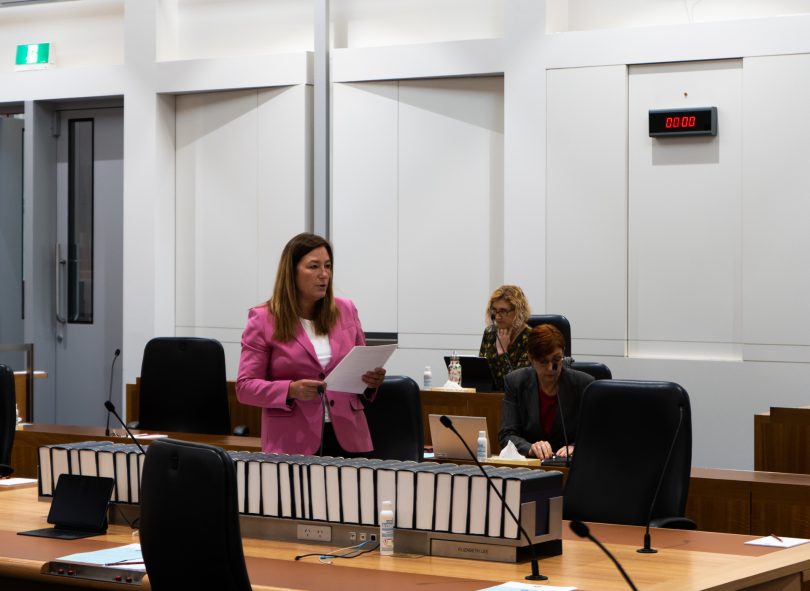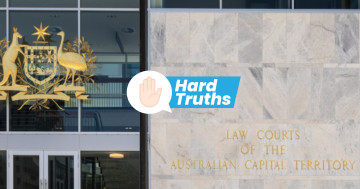
Women’s Legal Centre principal solicitor Claudia Maclean. Photo: Dominic Giannini.
Mothers and children are being forced to sleep in their car as access to emergency housing in Canberra reaches a crisis point, according to Women’s Legal Centre (WLC) principal solicitor Claudia Maclean.
Victims of domestic abuse and violence who attend WLC have been told they could not access emergency accommodation for up to two weeks, said Ms Maclean.
“It is not only quick access to cash [that victims need], but access to long-term safety solutions,” she said. “Part of that is access to legal support, social support and housing.
“Any form of practical support for victim-survivors is always a good start, particularly in Canberra where we have the highest cost of renting and housing shortages.”
ACT Minister for Women and Minister for the Prevention of Domestic and Family Violence, Yvette Berry, said the ACT Government provides funding to services to assist people who are experiencing domestic violence so they can access emergency accommodation immediately.
This includes hotel accommodation in the short-term before more stable and long-term accommodation can be found, she said.

ACT Minister for Women and Minister for the Prevention of Domestic and Family Violence, Yvette Berry, updated the ACT Legislative Assembly about the government’s progress on sexual assault legislative reform on Tuesday, 11 May. Photo: Dominic Giannini.
However, Ms Maclean said a few nights in a hotel is a band-aid solution when access to public and social housing in the ACT is limited.
Currently, the average wait time for a priority house is 280 days.
“There is a disconnect,” said Ms Maclean. “People can spend a few nights in hotels here and there, but then there is a gap between emergency accommodation and emergency housing.”
Ms Berry said the ACT Government also supports people who experience domestic or family violence by ensuring they remain safe in their own homes by removing the perpetrator.
But this could also be problematic, said Ms Maclean, especially when they are the sole income earner and leave the family and children without income or access to money.
“For some, knowing the perpetrator is in prison is the only thing that will keep them safe, but for others, it is an absolute crisis because they have lost any form of financial support,” she said.
Discussions about domestic violence law reform were reinvigorated this week when ACT Opposition Leader Elizabeth Lee released a draft bill for consultation, which would impose additional sentencing penalties within the context of family violence.
The reform is welcomed by the WLC, although Ms Maclean said it is important that current laws are adequately policed and enforced.
A review into the Family Violence Act (2016), handed to the ACT Government in 2020, found police responses to family violence orders (FVO) and the exclusion of specific types of abuse and problems with after-hours orders left victims in a vulnerable and precarious position.
It also flagged amending the definition of family violence in the act to cover technological abuse, coercive control and cultural abuse.
Ms Maclean said it is too early to tell if the review has had any impact on how FVOs are enforced.
Some WLC clients said their case could not be investigated because it was a ‘he said, she said’ situation, while others reported having positive experiences with police.
And when cases are dismissed by police or go to court and either fail to record a conviction or record a lenient conviction, perpetrators become emboldened and can feel untouchable, said Ms Maclean.
Following a case where a perpetrator attacked his wife with an axe before holding the weapon to his daughter’s throat but only received four months in prison, the Office of the Director of Public Prosecutions (DPP) warned that sentences for domestic violence offences in the ACT are too lenient.
Ms Maclean said that while family violence is complex and it is not as simple as using jail time as a deterrent, strong penalties articulate what society thinks is acceptable and unacceptable behaviour.
Support is available through the Domestic Violence Crisis Centre’s 24/7 Crisis Line on 02 6280 0900, or through 1800 RESPECT (1800 737 732).





















